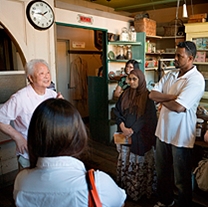 |
|
Grantee: International Coalition of Sites of Conscience Grant: 21st Century Museum Professionals (now National Leadership Grants for Museums), 2007 and 2010 Pictured: Dialogue at a coalition member instituion, the Wing Luke Museum of the Asian Pacific American Experience |
|
Contact: Sarah Pharaon
Website: |
We often tend to undervalue personal connection in the era of online learning and virtual contact,
but projects like this hinge on the power of coalition and connection. There is so much gained in
working together across the country. All the programs are stronger and better because we work
across regions and sites, meet face-to-face, and build peer learning and support networks.
–Sarah Pharaon, Program Director, North America,
International Coalition of Sites of Conscience
Dialogues on Immigration: Empowering New Voices
America’s perceived role as a cultural melting pot has always come up against the tensions, challenges, and confusion inherent in bringing together people with vastly different cultural heritages, customs, languages, expectations, and perspectives. For the past two years, professionals from 20 museums across the country have united and committed to making local museums a productive and safe forum for communities to explore the historical context and current challenges of immigration.
The International Coalition of Sites of Conscience is a network of historic sites and museums that preserve and share history to inform and inspire current efforts for human rights and social justice. Several member sites became interested in the power of dialogue to engage visitors in the history of their sites and inspire civic engagement on current immigration issues. The idea was not to lecture visitors but, through dialogue, to share a peer learning experience, broaden perspective, and develop consensus on how to take action.
Partnering to Build Dialogue Strategies and Programs
A three-year IMLS grant supported the development of a Sites of Conscience peer network spanning the American Southeast and Southwest, providing regional training events and project resources to plan and launch pilot projects at each site. The first event provided training on the dialogue process and included scholars, activists, non-profits, and grassroots organizations, including the national organization Welcoming America, which focuses on working with receiving communities on immigration issues. The second event included communications and outreach training, preparing participants to make contacts and draw diverse audiences to their sites. The third meeting added evaluation training to help define what success looks like for an immigration dialogue program, an important step in building evaluation tools specific to dialogue programs that can be shared across the sites and beyond.
Pilot projects are quite diverse; they may be targeted to school-age visitors, the general public, or specific audiences such as uniformed police. Each program is based on the unique resources of the specific museum and its staff, using the collections and the site’s history as context and a springboard for dialogue. The programs also tap contemporary resources such as news coverage and articles. For example, the Arab American National Museum in Michigan uses an exhibit on Arab and Muslim civil and military service to explore issues of patriotism, immigration, and citizenship, and the dual loyalty of ethnic identity and national home.
With additional support from the National Endowment for the Humanities and the Nathan Cummings Foundation, the program will expand to include the Northeast region and sponsor a national summit that will bring together all sites and their community partners for the first time. The project will establish a National Dialogues on Immigration website in 2014 to support sharing among staff and visitors to the 25 dialogue programs and make many of the training and program resources available online.
Learning Through Dialogue
The experience of one pilot site brought home the importance of not making assumptions about communities or prospective audiences. When the National Civil Rights Museum first considered a dialogue project, staff members were concerned about mission fit and doubted that their audiences would embrace the topic of immigration. But an onsite survey found that visitors and stakeholders felt strongly that the museum was exactly where contemporary civil rights issues should be addressed.
Another lesson was the importance of regional and local tailoring of the projects, especially for communications. Terminology that is successful in some areas may make people nervous or alienated in other regions. Drawing on key concepts that go beyond the term “immigration” proved to be a successful tactic; for example, civic engagement and identity are core and common values.
With increasing dialogue work came increasing levels of comfort for pilot project staff. It became clear that it really is all right to take risks and engage uncomfortable or contentious topics. People respond positively when they can speak and receive information with support from knowledgeable dialogue facilitators in an environment that is inclusive of all perspectives.